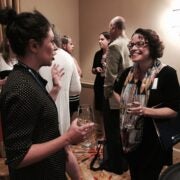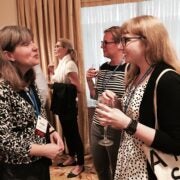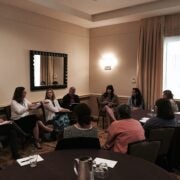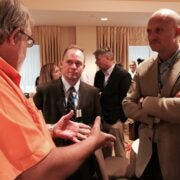Writing a Book in a Digital Age

The students of the Jacksonville Female Academy seated in front of Academy Hall, ca. 1890. The team at Illinois College plans to incorporate this photo into the Jacksonville Female Academy collection on Artstor.
Jenny Barker Devine, Associate Professor of History at Illinois College and the author of On Behalf of the Family Farm, shares her thoughts on how the Consortium on Digital Resources for Teaching and Research will impact her upcoming book. This essay first appeared on her blog American Athena.
With American Athena, I want to write a new kind of book – one that exists in a dynamic and living space, responsive to readers and as instructive in design as it is in content. This new kind of book acknowledges the reader as an active participant in producing new knowledge. A kind of crowdsourcing.
In addition to the blog and the book manuscript, I am creating online collections that will allow you, the reader, to interact with the same documents, photographs, and artifacts that I see (and hopefully offer your own interpretations of them). With any luck and lots of hard work, the first images will be available in spring 2016.
This is something I’ve wanted to do for a while, but Illinois College’s digital infrastructure just didn’t support my end goal. Then, Danielle Trierweiler, IC’s Digital Services Librarian, approached me last spring with the idea to apply for the Council of Independent Colleges’ Consortium on Digital Resources for Teaching and Research, which, in cooperation with Artstor, provides Consortium members with access to Shared Shelf [now JSTOR Forum], “a cloud-based asset management service.” This allows us to make key records of the Khalaf Al Habtoor Archives available to a global audience and forces me, at an early stage, to curate important documents central to my research. As an author, I find this incredibly exciting.
As members of the Consortium, we have an amazing opportunity to work with librarians and faculty from independent colleges across the country. Last week, Danielle and I attended the first national workshop for the Consortium on Digital Resources for Teaching and Research in Washington, D.C. The workshop provided technical instruction on using [JSTOR Forum], and included presentations on projects at other institutions, integrating the resource into undergraduate teaching, copyright standards (by far the most popular of the workshop), and the various portals and platforms through which we can make our collections available (including the Digital Public Library of America and Artstor, or our own sites through Omeka).
- Consortium on Digital Resources for Teaching and Research
- Consortium on Digital Resources for Teaching and Research
- Consortium on Digital Resources for Teaching and Research
Hands down, the best part of the workshop was the networking. Everyone there came from institutions with similarities in staffing, budgets, and a focus on undergraduate teaching. I met a geologist from Bellarmine University in Kentucky who is digitizing her rock, mineral, and fossil collection. The crew from St. Mary’s University in Leavenworth, Kansas is documenting an extensive collection of Abraham Lincoln images and artifacts (including a lock of his hair). A team from Tuskegee is uploading audio of speeches given at the university during the Civil Rights era. At Wofford College in South Carolina, they’re posting an entire herbarium. Just to name a few. The scope and interdisciplinary range of projects is inspiring, as the librarians and faculty are transforming scholarship and student learning with digital tools. Even better is the fact that the Consortium is a 4-year project… so we get to meet everyone again next year.
- Consortium on Digital Resources for Teaching and Research
Not everyone is excited about publication in the digital age. Whether or not you identify as a reader, it’s impossible to deny the centrality of the book in Western culture. We love books. Books hold promises for unlimited possibilities. Books reassure us that our ideas will live on long after we’re gone. We demonstrate our greatest contempt for an idea by burning the books that purport them and we show reverence to holy books through ceremonial disposal. Even the most reluctant readers find gratification in the crackling of the spine and the pulpy smell of a new book, and we revere the old dusty volume that begs to be rediscovered. Some argue that this reverence will be lost in the digital age, much to the detriment of our intellectual development. I don’t see it that way.
In recent years, publishers, readers, scholars, and well, everyone has debated what will happen to the printed word in a digital world. In April 2015, the American Historical Association devoted one issue of its magazine, Perspectives, to questioning whether history should remain a discipline dedicated to the production of books.The central question was: could productive debates take place in mediums other than refereed books and articles? Claire Bond Potter (formerly The Tenured Radical), contributed an essay asking: “Is Digital Publishing Killing Books?” Her short answer to the question was a resounding, “No!” Potter, herself a proponent, writer, and lover of the printed word, argued that:
digital technology is diversifying, not destroying, scholarly publication. It permits greater access to audiences… Technology can enhance comprehension with embedded documents, high-resolution images, video, and music in an electronic book. Digital projects also promote collaboration… Perhaps the greatest misconception about digital history is that it makes everyone her own publisher, bypassing peer review. To the contrary, digital historians tend to expand the review process beyond one or two experts, often asking a crowd to evaluate the content and design of a digital book or project.
My approach here is not revolutionary. More and more writers and publishers are creating companion sites to accompany books. I’m jumping the gun a bit and starting a bit earlier to really figure out how writing and publishing are very different in the digital age. It’s even different from when I started the publication process on my first book in 2009. And to be honest, I’m not at all anxious about it. Thanks to Danielle at IC, the CIC, and [JSTOR Forum], I’m in good hands and I’m pretty excited.
A big thanks to Susan Barnes White, the CIC, and Artstor for putting on an excellent workshop. See you next year!!



